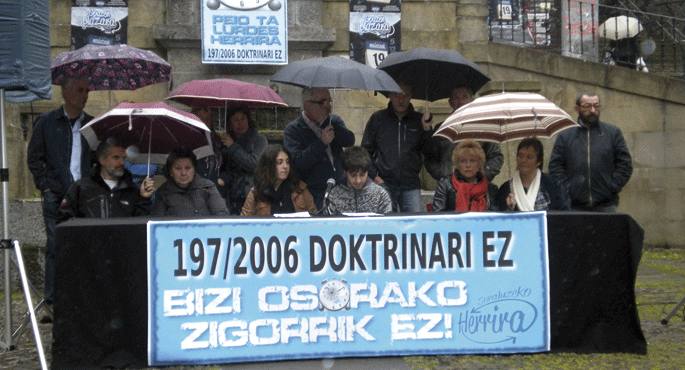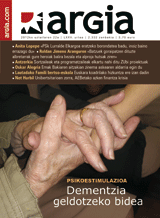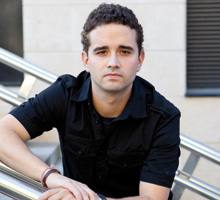Some walls start to fall

INFORMED BASQUE CITIZENSHIP is aware that Spain has violated human rights for decades and continues to violate them. In the fight against ETA, moreover, there are many citizens who have justified these atrocities and, in the face of ETA violence, have assumed the violence of the state, either from the shadow of Congress or from the stream of the sewers. The State has repeatedly distorted its rules in order to subject what was not legal to the Constitution.
And sometimes the courts also ratify the existence of a number of rights which, as the Strasbourg Court has now done with the Parot doctrine. ETA prisoners and non-ETA Basque prisoners have had to suffer from everything on the part of the state, and the most cruel measure against them has been the reading of the rule that has now been repealed from Europe, which has been contrary to human rights.
After the case of Inés del Río there will be many others. On the one hand, the appeals of some twenty prisoners rejected by the Constitutional Court in March and June of this year go to Strasbourg. And we will have to see what happens to all the appeals still pending by this court (21 of them admitted and 14 not yet passing the screening of admission).
We will probably have to see what happens to Spain's appeal to the Court in Strasbourg, but the Inés del Río appeal was unanimously approved and it does not seem that Spain will accept the appeal. And if the Del Río judgment is confirmed, the Spanish Government will have to release the prisoner, he has no choice but to do so.
It would be logical for the Spanish Constitutional Court to take over the judgment of the Strasbourg Court, annul the Parot Doctrine and put all the prisoners affected by it on the streets. In the new time we are living, all this should be a consensual path, without court order: in addition to avoiding a lot of time, money and suffering, the paths of peace would be consolidated in a remarkable way.
Between wage cuts and the constant loss of social rights, some hypotheses are reinforced. Firstly, austerity measures do not lead to economic growth, as, among other things, they are mainly aimed at paying off debt. Two, the public and private debts of many countries are unpayable: How, for example, is the private and public debt estimated at 2.3 trillion to Spain paid? Three, any solution requires a serious audit of that debt in order to decide what can and cannot be paid.
More general questions are also gaining more and more solid ground between thinkers and citizens. For example:
One, is it possible for the people to reverse this European construction of Maastricht and to embark on a new convergence of the economy and social rights?
Two, because in the short term it looks very bad, does it make sense to keep the drowned countries in crisis in the euro? And if some are starting to emerge from the euro, will the European Union resist?
-Three, the process of globalisation started in the mid-1970s, is it time to start deglobalising Europe? Or is it possible to regulate globalisation, by giving its rules scope to social rights?
-Four, after successively destroying the social walls of Europe, must we admit that neoliberal capitalism has expired and surrendered?
The answers are mainly in the hands of the citizens.
Etxerat elkarteak "urgentziazko balorazioa" plazaratu du Espainiako Auzitegi Gorenak hartutako erabakiaren ostean. Osorik eskaintzen dizuegu jarraian:
Carmen Gisasola aske geratu da astelehenean, kartzelan 24 urte eman ondoren. 1990. urtean atxilotu zuten Gaskoiniako Landetan (Okzitania) eta azken urteetan Zaballako (Araba) kartzelan zegoen preso. Langraitz bideari helduta, hirugarren graduan zegoen Gisasola.
Jose Ricardo de Prada epaileak “neurriz kanpokotzat” jo ditu ETAko presoei ezartzen zaizkien kondenak. ETAkoak ez diren presoek betetzen dituzten zigorrekin alderatuta, aldea “handiegia” dela adierazi du.
Presoen espetxeratzea urtebete edo bi luzatu ahalko dute neurri berriaren ondorioz. “Parot doktrina” delakoarekin alderatu dute Espainiako Auzitegi Nazionaleko bi magistratuk.
Estrasburgoko Giza Eskubideen epaitegiak ‘Parot doktrina’ ezeztatzearekin batera 30.000 euroko ordaina ezarri zuen Ines Del Riorentzat. Espainiak uko egin dio ordaintzeari.
Estrasbusburgoko Giza Eskubideen epaitegiak 197/2006 doktrina baliogabetu ostean, 20 preso askatu dituzte aste honetan: hamalau hilaren 26an eta sei 27an.
Auzitegi Nazionalak beste bederatzi preso askatzeko agindua eman du, 'Parot doktrinaren' aurkako Estrasburgoren ebazpena aplikatuta.
Espainiako Auzitegi Konstituzionalak gaur markatuko du Estrasburgoren ebazpenaren gaineko irizpidea, Iñaki Fernandez de Larrinoa presoaren auziari buruzko erabakia hartzean.
Espainiako Auzitegi Nazionalak beste 13 euskal preso askatzea erabaki du, Estrasburgoren epaia aplikatuta. Hemendik aurrera, ebazpenaren inguruko erabakiak ez dituzte Zigor Salaren osoko bileretan hartuko, eta horrek preso bakoitzaren prozedura azkartzea ekarriko duela espero... [+]
Estrasburgoko Giza Eskubideen Epaitegiak 197/2006 legearen zenbait praktika baliogabetu ostean, asteartearekin hitzartuko du Espainiako Auzitegi Gorenak nola aplikatu sententzia, Europa Pressen arabera.
Espainiako Auzitegi Nazionalak 197/2006 doktrina aplikatu zitzaien bederatzi preso aske uztea erabaki du. Ondorengoak dira presoak: Txomin Troitiño, Isidro Garalde, Iñaki Urdiain, Jon Aginagalde, Jokin Sancho, Elías Fernández Castañares,... [+]





















